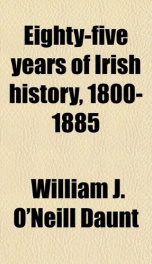eighty five years of irish history 1800 1885

Purchase of this book includes free trial access to www.million-books.com where you can read more than a million books for free. This is an OCR edition with typos. Excerpt from book: Parliamentary Corruption in England and Ireland. 29 euch language from our equals; far less will we endure it from the upstart pride of chance nobility." The feeling of the whole House was with the Duke. Clare had not the poor consolation of sympathy or pity from any man, even of his own political party. His influence, once almost omnipotent, was now extinct. He returned, mortified and broken-hearted, to the country he had betrayed and ruined, cursing the part he had taken in promoting the Union. "There was a time," he said, with great bitterness, " when no appointment could be made without my sanction ; now I am unable to make so much as a clerk in the Excise." He tried to dissipate his chagrin by violent equestrian exercise. His death was hastened by a severe hurt he received while riding in the Phosnix Park. He died in January, 1802, expressing in his last hours deep though unavailing remorse for his criminal co-operation with Pitt against the Irish Constitution. His fall may be regarded as a signal instance of the retributive justice of Providence. Of his lineage the following account is given in the publication already quoted: " He is removed but two degrees from a man in the humblest walk of societya Catholic peasantwhose life was distinguished only by a gradual transition from extreme poverty to an honourable competency; and that, too, acquired by useful industry." By his criminal political career he gained a peerage, which is now extinct. The so-called honours, for which he bartered the vital interests of his country, have passed away. CHAPTER III. PARLIAMENTARY CORRUPTION IN ENGLAND AND IRELAND. How did they pass this Union ? By perjury and fraud. By slaves who sold, for place or gold, Their country and their God; By all the savage acts th...
Info about the book
Author:
Series:
Unknown
ASIN:
B007JU0JW8
Rating:
4/5 (1)Your rating:
0/5
Languge:
English
Users who have this book
Users who want this book
What readers are saying
What do you think? Write your own comment on this book!
write a commentif you like eighty five years of irish history 1800 1885 try:
Other books by this author
Do you want to read a book that interests you? It’s EASY!
Create an account and send a request for reading to other users on the Webpage of the book!

